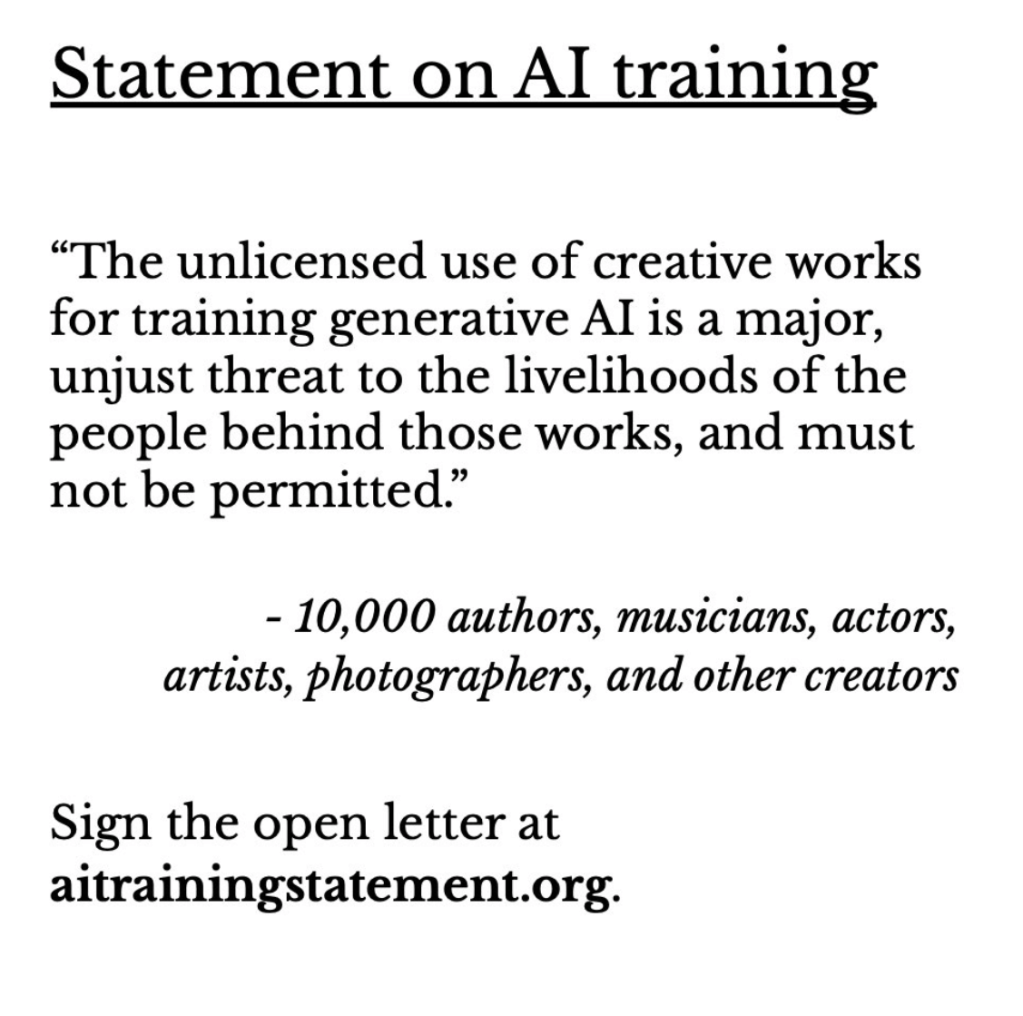Chris Castle dives into AI advancements that are rooted in what he calls “the largest cultural theft since World War II.” Explore the Statement on AI Training, striking parallels to historical art appropriation and why the fight for creators’ rights is more urgent than ever.
Statement on AI Training signals Appropriation and Cultural Theft
by CHRIS CASTLE via Music Tech Policy
You may have seen “the statement” at aitrainingstatement.org that is signed by a very large group of creators whose work has been appropriated by what is likely the largest case of cultural theft since World War II.

Aside from the fact that these 10,000 are a good start for an opt-out list, the size and scope of the creator group shows you the vastness of the cultural appropriation being wrought by the richest companies in commercial history.
Big Tech’s campaign against creators actually began long ago with one goal under the digital whip: Force people to work for free. Extract the labor value from human efforts and free rider profit from it. Seems like humanity have been down this path before.
With 20/20 hindsight I hope that people understand why I pounded the table so much about the human rights issues involved with Google & Co.’s disregard for the human rights of artists. Now it should be obvious that what was afoot in the Google Books case, for example, was not the “snippits” that preoccupied the settlement, it was the nondisplay uses that were insufficiently addressed. It was the large language model called Google Books that appropriated all the world’s culture to use for products like corpus machine translation that Jean Noël Jeanneney warned of in his 2006 book, Google and the Myth of Universal Knowledge.
This has cumulated in Big Tech’s creation of the ultimate intellectual property, the artificial intelligence that is owned property and that exploits massive cultural appropriation—else it has no use. In order to create this source of no-cost labor that Big Tech will sell us (and sell to the military-industrial complex, make no mistake), Big Tech has engaged in possibly the largest cultural theft in world history.
But it’s not the first time.
If you’ve seen the movie The Monuments Men, you’ll know someone tried this before, at least the appropriations part. We did not wait around to find out what Herr Hitler intended to do with the cultural works he appropriated. Based on a variety of human rights documents starting with the Charter of the International Military Tribunal for the Nurenberg Trials and continuing today through the jurisdiction of the International Criminal Court and UNESCO, cultural appropriation can be a crime. Individuals can be charged as can corporations that were their confederates, or perhaps who acted through their AI alter ego.
“they have already stolen human culture”
And always remember–they have already stolen human culture. This isn’t about rules to keep it from happening, it’s already happened. The rules should be about who goes to prison to atone.
We usually use the terms “crime against humanity” or “crime against peace” to describe an evil act of such scope or depravity that we frankly don’t know what else to call it. The current state of AI appropriation by Big Tech is just such a crime. That AI appropriation will just fester and putrefy if we fail to address it for what it is—a crime against humanity. And remember, at least one Nazi art case used adverse possession as a defense to retain possession of after-acquired stolen art.





